In a remarkable instance of self-awareness and quick thinking, 49-year-old legal secretary Stacey Yepes from Toronto captured her own stroke symptoms on video, providing a vivid and personal insight into the medical emergency as it unfolded.
Driving home from work on a typical April day, Yepes experienced an unsettling sensation that prompted her to pull over and use her smartphone to document what she was undergoing.
“The sensation is happening again,” Yepes articulated with difficulty in the video, noting a tingling sensation on the left side of her tongue.
Despite struggling to speak, she followed breathing techniques advised by doctors, revealing her confusion and concern: “I don’t know why this is happening to me.”
This episode was not Yepes’s first encounter with stroke-like symptoms. She had visited the hospital a few days earlier after experiencing similar signs, only to be told by doctors that stress might be the culprit. Unconvinced by this diagnosis and determined to have concrete evidence of her condition, Yepes resolved to record the episode if it recurred.
Following the incident captured in the video, Yepes went to the hospital and was subsequently referred to the Krembil Neuroscience Center at Toronto Western Hospital. There, medical professionals suggested she had suffered a transient ischemic attack (TIA) or “mini-stroke,” caused by blood clots. Further tests confirmed that Yepes had indeed experienced a small stroke.
Reflecting on her lifestyle, Yepes acknowledged the role of stress, irregular eating habits, and a lack of regular exercise, despite her perception of leading a healthy life. “The (Transient Ischemic Attack and Minor Stroke) TAMS Unit has really taught me a new way of living and how to address these areas so I don’t have another stroke,” Yepes shared in a news release from the University Health Network Toronto.
Her neurologist, Dr. Cheryl Jaigobin, emphasized that strokes can occur in younger individuals who seem healthy and have minimal risk factors. She highlighted the importance of being vigilant about health changes, especially for those with a family history of stroke or heart disease.
The American Stroke Association reports that approximately 795,000 Americans experience a stroke each year, with 137,000 fatalities, making it the fourth leading cause of death in the United States.
Stacey Yepes’s experience serves as a powerful reminder of the critical importance of recognizing stroke symptoms and seeking immediate medical attention. “My advice to others is, if you think you’re having or had a stroke, don’t wait. Go to the hospital and get checked out,” Yepes advises, underlining the urgency of acting swiftly in such potentially life-threatening situations.







